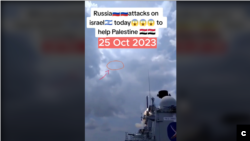Disinformation about the Israel-Hamas conflict continues to inundate social media, which a younger demographic increasingly uses as a news source.
On October 25, a TikTok user called news_fast2 shared a video showing a warship firing a missile. The post received 4 million views and 53.7k likes as of the time of this writing.
The caption reads:
"Russia attacks on Israel today to help Palestine. 25 October 2023.”
That is false.
The video shows the INS Teg, a stealth-guided missile frigate that Russia designed and built for the Indian Navy, test-firing the Indo-Russian BrahMos supersonic cruise missile in the Bay of Bengal in April 2017.
Footage of the original missile launch is available on YouTube.
Misuse and misattribution of old footage have become a signature disinformation tactic for the Israel-Hamas war.
Polygraph.info has documented several such examples, including attempts to pass off footage from the war in Syria and of militant activity in the Philippines as coming from the Israel-Hamas conflict.
Social media platforms further incentivize regular users without apparent links to state actors to spread mis- or disinformation.
Fortune reported on October 12 that TikTok users can pay as little as $7 to promote their posts, attracting thousands of views.
This, Fortune said, has opened a “low-cost pathway to spread propaganda on hot-button topics.”
When notified about the planned publication of the Fortune article, TikTok removed sponsored content from searches for “Israel” “Palestine” and “Israel Palestine,” Fortune reported.
The post from news_fast2 was one of the first results to appear on TikTok when searching “Gaza” on October 27.
News_fast2 appears to have started posting on October 14 and has only posted content related to the Israel-Hamas conflict.
Its fake claim that Russia had attacked Israel has generated more likes and views than all of its other posts combined. It is unknown if News_fast2 paid to promote that post.
The European Commission has sent formal requests to Meta and TikTok to provide information on what measures they're taking to stop "the dissemination and amplification of illegal content and disinformation" related to the Israel-Hamas conflict.
The EU is also investigating X over the spread of violent content and disinformation on the platform.
Following the EU request, TikTok said it had launched a command center “to respond to this fast-evolving crisis.” It is also adding more moderators who speak Arabic and Hebrew and evolving its “proactive automated detection systems in real-time.”
Following its October 7 attack on Israel, Hamas has targeted social media users and groups with disinformation designed to incite hatred toward the Jewish state.
Analysts say state actors, namely China, Iran and Russia, are also spreading false claims about the conflict to sow chaos and advance their own interests.
On October 26, Russia hosted a Hamas delegation in Moscow to discuss the situation in the Gaza Strip, which Hamas governs. Iran’s Deputy Foreign Minister Ali Bagheri Kani was also present for those talks.
Russia has long cultivated relations with Hamas and is a strategic ally of Iran, which provides Hamas with weapons, funding and training. Iran has also provided Russia with drones and other support to prosecute its war in Ukraine.





